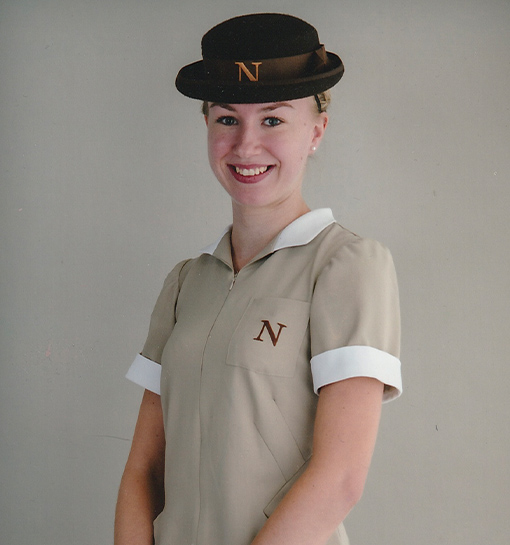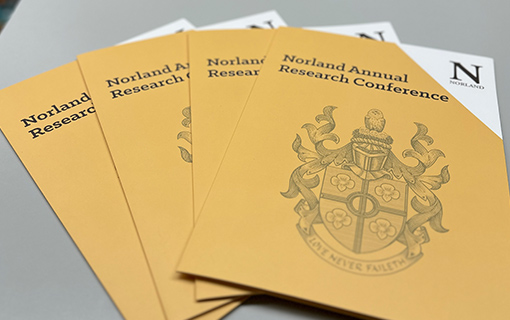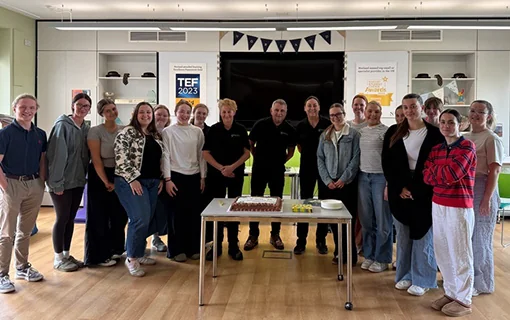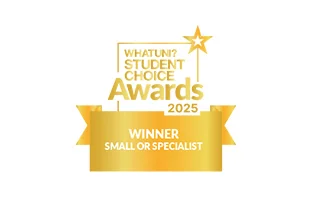Supporting students from under-represented groups

Norland is firmly committed to ensuring that the life-changing and significant career opportunities it offers are available to all. Find out how we support students from under-represented groups.
After receiving an offer, all applicants are sent a bursary application form. All bursaries are means tested. Additional consideration is given to students from under-represented groups at Norland who meet one or more of our Widening Participation criteria. You can read more about this on our finance and bursaries page.
If you’d like to discuss any of the information on this page and how it relates to your application to Norland, please contact our Admissions or Student Support teams who will be more than happy to help.
The information below outlines how Norland supports students from under-represented groups as well as links to helpful resources and information. Click on the links below to see information about that particular group.
View finance and bursaries page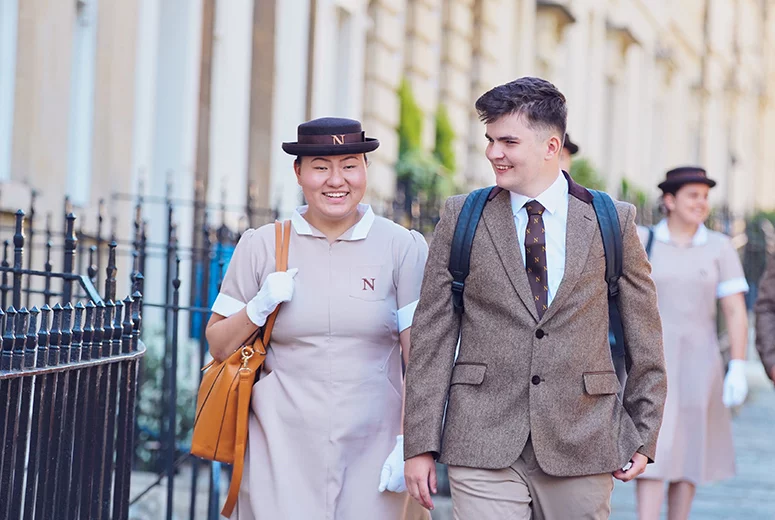
Students with disabilities
Find out moreStudents from under-represented ethnicities
Find out moreMale students
Find out moreCare experienced or estranged students
Find out moreStudents from the LGBTQ+ community
Find out moreStudents who are refugees or asylum seekers
Find out moreMature students
Find out moreCommuter students
Find out moreStudents from low income households
Find out moreStudents with disabilities
UK home students who have a disability such as a long-term health condition, a mental health condition or a specific learning difficulty can apply for a Disabled Students’ Allowance (DSA) to help pay for the extra costs that you may have as a direct result of your disability.
The Student Support team can provide help with your application for this support if you need it. Contact the team via email to find out more.
Key information
- DSAs are grants to help you pay for the extra essential costs that you may have as a direct result of your disability, including a mental-health condition or specific learning difficulty such as dyslexia or dyspraxia. You don’t have to pay these back.
- DSAs can help pay for essential extra costs you might have as a direct result of your disability, such as travel costs and assistive software.
- DSAs are not provided by the Student Support team at Norland, but the team can assist you with your application.
- DSAs don’t depend on household income – what you can get depends on your individual needs.
- DSAs don’t pay for personal care.
- If you are not a UK student, you may be able to apply for a bursary to assist with your finances.
- For more information on applying for a DSA, visit the UCAS website.
Am I eligible?
You can apply for a DSA if you have a disability such as:
- a long-term health condition.
- a mental health condition.
- a specific learning difficulty like dyslexia or dyspraxia.
You must also:
- be an undergraduate or postgraduate student (including distance learning).
- have a condition that affects your ability to study.
- qualify for student finance from your funding body.
- be studying on a course that lasts at least a year.
You can’t get a DSA from Student Finance England if you’re:
- an EU student.
- an overseas/international student.
However, Norland is still committed to ensuring you receive the necessary support, so please contact the Student Support team who will arrange an informal meeting to discuss your needs.
Helpful links for students with disabilities
Students from under-represented ethnicities
We actively encourage and support students from under-represented ethnic groups at Norland. We have a particular concern to broaden, not only our own student demographics, but to improve the participation of under-represented ethnicities in the sector. We hope the resources here are helpful in addressing some of the unique barriers that students from minority groups may face.
Following the Black Lives Matter demonstrations in 2020, Norland created the Anti Discrimination Innovation Team (ADIT). While it considers anti-discrimination practice generally, the discussion around race equality on campus and in the curriculum, is a key part of the team’s focus. The team is made up of staff, students and alumni.
Read our widening participation statementHelpful links for students from under-represented ethnicities
Mind
Mind's advice for students from Black, Asian and Minority Ethnic (BAME) communities
Visit Mind's websiteNilaari
Bristol-based charity Nilaari offers wellbeing and mental health support, talking therapies and advice
Visit Nilaari's websiteSARI (Stand Against Racism and Inequality)
SARI provides free and confidential support for anyone who is a victim of hate crime across Avon and Somerset.
Visit SARI's websiteBlack Minds Matter UK
The Black Minds Matter UK charity connects Black individuals and families with free mental health services.
Visit the Black Minds Matter websiteSpark & Co
Spark & Co is a community interest group that provides support and education for black and minority ethnic groups.
Visit Spark & Co's websiteMental Health Foundation
The Mental Health Foundation offers information, advice and resources to support those from under-represented ethnic communities.
Visit the Mental Health Foundation's websiteMale students
Although Norland has fewer male students than female students, we’re dedicated to attracting more men to work in the early years sector. Current male students are actively involved in a regular social group and attend a range of sports clubs, both with Norland students and externally through Bath Spa’s Students’ Union and clubs in the city.
Sam (Set 46) says: “When applying, I found it useful to know that Norland had male students past and present. I also found it very useful talking to the male students both before starting via the chat to students page, during the first few weeks and seeing them both inside and out of college. I have found it really useful to socialise with male students in the other years. They have been incredibly supportive and have given me advice and confidence that I have chosen the right path. We continue to socialise and support each other as a small group of male students.”
Helpful links for male students
Men in the Early Years (MITEY)
MITEY is a campaign/networking group dedicated to bringing more men into the early years education workforce and support them once they are part of it.
Visit MITEY's websiteIke's My Norland Story
Watch Ike's My Norland Story about his journey to Norland and his time studying here.
Watch Ike's storyMatthew's My Norland Story
Watch Matthew's My Norland Story about his journey to Norland as a mature student and his time studying here.
Watch Matthew's storyRead Liam's blog
One of our first fully-qualified male graduate Norland Nannies reflects on his career so far and shares his advice to other male early years professionals.
Read Liam's blogCare experienced or estranged students
The legal definition of a care leaver comes from The Children (Leaving Care) Act 2000 which states that a Care Leaver is someone who has been in the care of the Local Authority for a period of 13 weeks or more spanning their 16th birthday.
We recognise that any time spent in local authority care, with kinship carers, under a special guardianship order, or being privately fostered can have an impact on educational opportunities, so we will provide you with support..
You will need to provide evidence that you were looked after in any of the above circumstances. This evidence is usually a letter from your local council, care authority, or from Student Finance confirming that you were under their care but have now left. They should also confirm that you are a care leaver as defined in the Children (Leaving Care) Act 2000. If your circumstances mean you do not have this evidence, please contact us via the Student Support email addresses at the bottom of this page and we can advise on alternatives.
If you are in care, or have experience of being in care in the past, there’s lots of support available at Norland to help you with finance, accommodation, and settling in. If this is disclosed on your UCAS form and you are offered a place at Norland, a member of the Student Support team will get in touch prior to your starting date so you can let them know if any specific support is needed. This will then be in place by the time you start your course. Additional support is also available for estranged students, young adult carers and foyer leavers. Applicants should contact their local authority who will offer help and advice on bursaries, travel costs, and other means of support.
You are classed as an estranged student if you are between 18 and 24 years old and have not had verbal or written contact with both of your biological, adoptive parents or only living parent and this circumstance will not change. If you are unsure if this applies to you, take a look at the Stand Alone Student Guide.
Once you have accepted your place at Norland, you will need to provide evidence that you are estranged. The easiest way to do this is to fill in the confirmation of estrangement form. You can get this form on your student finance account once you have submitted your application.
Otherwise, you can send a letter from your social worker, a doctor or teacher that knows your situation, or from a ‘person of good standing in the community’ (for example a solicitor, religious leader, or counsellor) or provide a police report showing any related incidents.
You will only need to provide evidence once, and we encourage you to get this to us as early as possible so we can provide support as soon as we can. Our services can only be provided after receipt of evidence and cannot be backdated.
If you think or know that you will be unable to provide this evidence, please contact our Student Support team as soon as possible to discuss your individual circumstances.
We understand that personal circumstances may have an impact on your grades at school or college and may not reflect your true potential. Therefore, we may accept lower grade requirements, and this is called a contextual offer. Once you have your results, contact our Admissions team and they will be able to discuss the options with you, which may be different to the typical offer shown on the course pages on our website or in our prospectus.
Please indicate any care experience or your estrangement in your application form to the University and ensure that you select the UCAS tick box to indicate these circumstances. You can also put this information in your personal statement or have your applicant referee include this in your reference. Alternatively, you can contact our Admissions team.
Before starting with us:
- We will provide you with a named contact to speak to at Norland.
- You can contact them before you join us and during your studies.
- You are invited to visit Norland for a personalised 1:1 experience. To arrange this and discuss what you would like to see, please contact the Student Support team.
Wellbeing services:
- You will be contacted by a member of the Student Support team within the first month of your course start date and offered an academic assessment meeting, so that we are able to provide the right support for your needs.
- You will be signposted to extra study skills sessions, the library, and disability and inclusion services in the local area.
- You will be allocated a Personal Tutor who will be your main point of contact for the duration of your studies. You will have the option to meet with your tutor after every assessment to go through your feedback.
- Your tutor will work with you to create a Personal Development Plan to help with goal setting and time management.
- You can access up to 12 free counselling sessions per academic year with our Norland counsellors.
Accommodation:
- You will have the option of accommodation for 51 weeks of the year and our Accommodation Officer will contact you prior to allocation to ensure your needs are met.
- You will be contacted by our Accommodation and Welfare Officer prior to starting at Norland, to discuss your housing requirements.
- The Accommodation and Welfare Officer will offer 1:1 check in sessions and house visits every trimester.
- You will be assigned a personal and specially trained ‘Norland Buddy’ to help you settle in and make friends when you first arrive.
Financial support from us:
- We will provide a bursary of up to £10,000 per progressive academic year.
- Find out more about bursaries and financial assistance here.
- You can arrange a 1:1 meeting with the Finance team at any time if you need information about student finance and budgeting.
- We will provide a Microsoft device for you to use for the duration of your studies (laptop or tablet).
- We can offer a contribution to graduation costs.
Helpful links and resources for care experienced or estranged students
Stand Alone
Stand Alone supports individuals who are estranged from their families
Visit Stand Alone's websiteThis Is Us
This Is Us is a student-led community that connects estranged and care-experienced students
Visit This is Us's websiteBecome
Become is a charity that supports care leavers to fulfil their potential
Visit Become's websiteUCAS application advice
Information from UCAS for undergraduate students with caring responsibilities
View the UCAS websiteUCAS finance
Information from UCAS on scholarships, grants and bursaries for students with caring responsibilities
Visit the UCAS websiteUCAS application advice
Information from UCAS about students with caring responsibilities
Visit the UCAS websiteBANES Carers' Centre
Bath and North East Somerset Carers' Centre supports friends and families helping their loved ones.
Visit BANES's websiteThis Is Us
This Is Us is a community for estranged and care experienced higher education students
Visit This Is Us's websiteStudents from the LGBTQ+ community
Norland welcomes all students including those that identify under the LGBTQ+ spectrum. We offer a welcoming environment free from harassment, discrimination and bullying. There may be times when you need additional support or guidance and there are a number of places you can access this.
Trans students
Norland is committed to providing support to all students who are trans. Trans is an umbrella term encompassing all those who do not identify with the sex they were assigned at birth, including but not limited to those who are transgender, genderqueer, agender and non-binary. All staff have diversity and inclusion training which covers many topics such as using students’ pronouns correctly. If you need any advice on name changes or support, please contact Norland’s Student Services team who can offer a confidential, safe space to talk.
Gender neutral facilities
There are gender neutral toilets at both Oldfield Park and York Place. At Oldfield Park, these are on the first floor and top floor. At York Place, these are on the lower ground floor.
Pronouns
We encourage people to include their gender pronoun on their email signature and Zoom/Teams screen. This helps to remove barriers for our non-binary and trans communities and is an easy way to prevent misgendering. It also helps demonstrate the point that whether someone is cis or trans, their pronouns should never be assumed.
Helpful links and resources for students from LGBTQ+ community
Off The Record
Off The Record is a local group that supports young people from the LGBTQ+ community
Visit Off The Record's websiteVisit Bath
Visit Bath have information about the welcoming and inclusive community in the city
Go to Visit Bath's websiteStonewall
Stonewall is an organisation that stands for LGBTQ+ people's rights
Visit Stonewall's websiteRefugees and asylum seekers
In the UK, a refugee is a person who has fled their country, and is seeking protection because of a fear of being persecuted due to their race, religion, nationality, membership of a particular social group, or political opinion. An asylum seeker is someone who has applied for refugee status and is waiting to find out if it has been granted. If you are a refugee or asylum seeker, Norland recognises that you will have faced substantial barriers in your education and we are here to provide support. Contact the Student Services team for more information.
Helpful links and resources for refugees and asylum seekers
UCAS finance
UCAS list the bursaries, scholarships and grants available to refugees and asylum seekers
Visit the UCAS websiteBath Welcomes Refugees
Bath Welcomes Refugees is a charity that facilitates the settlement of those who come to the city seeking refuge
Visit Bath Welcomes Refugees's websiteStudent Action for Refugees
Student Action for Refugees is a national network of students building a society where refugees are welcomed
Visit STAR Action's websiteRefugee Education UK
Refugee Education UK has a helpful list of frequently asked questions for refugees and asylum seekers
Visit Refugee Education UK's websiteMature students
UCAS defines a mature student as any student who is over the age of 21 when they commence their studies. At Norland we welcome people of all ages to our community.
Adults returning to study are some of our most well-equipped learners, bringing skills and attributes gained from work, family and other life experiences. They come from a whole array of backgrounds, and at Norland we recognise that returning to study as an adult student can present its own challenges. The Student Services team are here to offer advice and support if you are a mature or commuter student.
Your applications process is the same as for other prospective undergraduates. Get in touch if you have any questions about how we can support.
Norland has a mature students group created by a current mature student. Nicola is happy to answer any questions you may have about life at Norland. If you email our Student Services team, they’ll be happy to put you in contact with the student to facilitate that conversation.
Helpful links and resources for mature students
UCAS application advice
UCAS have some helpful information on applying to university as a mature student
Visit the UCAS websiteBath Spa Students' Union
Norland students have access to Bath Spa University's SU which has a designated group for mature students
Visit Bath Spa SU's websiteUK Government
Government information on funding university as a mature student
Visit government websiteCUG
The Complete University Guide has some helpful information on applying to university as a mature student
Visit CUG's websiteCommuter students
Commuter students are defined as local students who live in the same travel to work area as their university or college.
Norland welcomes local students and is able to offer support through the Student Services team. Your applications process is the same as for other prospective undergraduate students. Get in touch if you have any questions about how we can support you, by contacting the Student Support team.
Helpful links and resources for commuter students
Students from lower income households
A low income scholarship, grant, or bursary is available to students whose family’s annual household income is below a certain amount. These aim to ensure that finance isn’t a barrier for students from less affluent backgrounds to pursue higher education.
Helpful links and resources for students from lower income households
NI Direct
Certain groups of full-time students may sometimes be eligible for income-related benefits
Visit NI Direct's websiteUK Government
The government website has useful information on extra financial help for lower income students
Visit government websiteUK Government
The UK government's website provides information on applying for Universal Credit as a student
Visit government websiteUCAS finance
UCAS have helpful information on scholarships, bursaries and grants for students from low income households
Visit the UCAS websiteBANES
Find out more about Bath and North East Somerset Council's welfare support that provides residents with short-term financial help in a crisis
Visit BANES's websiteEntitled To
View information about receiving Universal Credit as a student
Visit Entitled To's website
